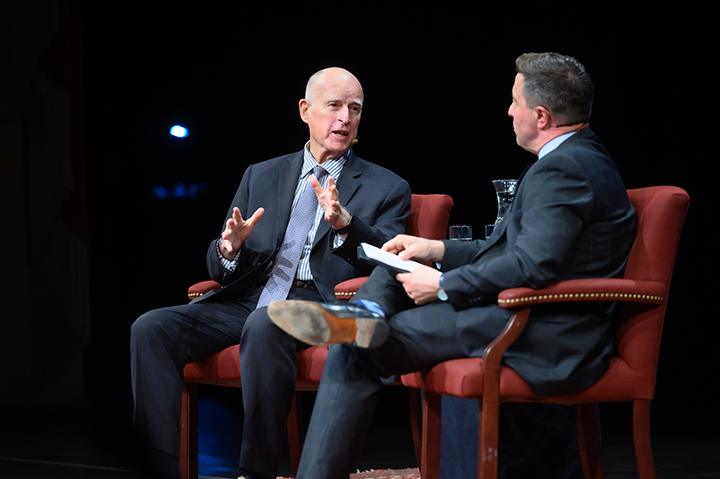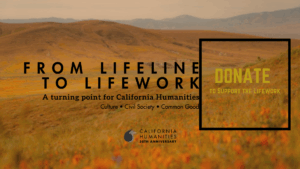The Political Mind of Jerry Brown, a radio and podcast documentary series on KQED’s Political Breakdown, gives listeners a front-row seat into the former governor’s mind. This January, the series, supported by California Humanities through a California Documentary Project grant, aired and also launched with a live in-person conversation between reporter Scott Shafer and Brown. We talked with host Scott Shafer about his insights, takeaways, and anecdotes he garnered from the more than 40 hours of interviews with Brown.
California Humanities: The new series from KQED The Political Mind of Jerry Brown is a monumental undertaking. You’re covering the story of a living person who has spent more time in elected office than almost anyone else. How did you go about deciding where to start with such a broad history to draw from?
Scott Shafer: We decided from the start that we wanted to cover his entire life, starting almost literally at the beginning with his childhood growing up in San Francisco. The path he took—son of a rising star Democrat, rejecting politics for the seminary then changing course and becoming governor at just 36 years-old—had so many interesting chapters that we decided to cover them all. And we decided to do it chronologically over the course of 30 hours (it ended up being more than 40).
CH: What was it like working to earn Gov. Brown’s trust?
SS: Gov. Brown had some experience with us already. Marisa Lagos, my co-host on Political Breakdown, had covered him for years with the San Francisco Chronicle before joining KQED. And he was our very first guest when the launched the show in January of 2018. So he knew us.
Still, it was a process. I sent a formal request to Evan Westrup, the governor’s long-time press secretary, and he brought it to Brown. After the governor said yes in principle, we worked on the details of what exactly we were asking for and how the recordings would be used. (The Oral History Center gives interviewees the right to edit transcripts for clarity and accuracy. KQED did not do that—we had full access to the original recordings).
Then we met with him in person at the governor’s mansion his final weekend in office to go through the details. All things considered, it was a fairly straightforward, easy process.
When we sat down to talk to him, we found him a little reluctant to talk at first, probably because we were talking about his childhood, which I’m guessing wasn’t that interesting to him. But he warmed up considerably after those initial sessions.
CH: After spending so much time with Gov. Brown, how would you characterize his leadership style?
SS: I’d say his leadership style has evolved, as you might expect, from his first eight years as governor. As we note in the podcast, his first time as governor was characterized by spontaneity, a lack of planning, and very long hours often unfocused on the practical matters a governor has to deal with.
By the time he was governor the second time, Brown showed much more discipline, organization, and focus. I think his wife, Anne Gust Brown, gets a lot of credit for that. His top staff, including the late Nancy McFadden who was his chief of staff until she died, helped bring order and accountability to the governor’s office that many felt was lacking in the 1970s and early 80s.
CH: Would you say that there are takeaways from his career about how to navigate polarization in this particularly partisan era?
SS: Gov. Brown talked a lot about how the partisan divide has sharpened since the first time he was governor. Back then Democratic and Republican leaders actually respected and liked each other and needed each other’s support to get things done. That’s much less true now and Brown seems to miss that aspect of leadership.
When was governor this last time he tried to bring Republicans in to work on issues like “cap and trade,” which eventually passed with the necessary two-third votes including a handful of Republicans. But that was more the exception than the norm.
CH: Why did you originally propose to do this project? And why now?
SS: As Gov. Brown’s final term was winding down—the fall of 2018 I think—it just occurred to me that someone should do an oral history of him. He’s such an iconic figure in California’s political history! I decided to reach out to Martin Meeker at the Oral History Center at UC Berkeley to see if they’d like to collaborate with KQED on this. Literally within hours he emailed back and said “let’s talk.”
It all worked out very well and I look forward to seeing the final product of their work—the bound full transcript of all our conversations.
Why now? Well, Jerry Brown isn’t getting any younger. At age 81 he’s still incredibly sharp but we wanted to talk with him while his memories were relatively fresh. We also, by the way, interviewed many others who knew him, from his sister Kathleen to his former Chief of Staff Gray Davis and members of his political team over the years. They provided critical context and analysis for what became our eight-part radio series and podcast, The Political Mind of Jerry Brown.
CH: What kind of role do you see Political Breakdown and projects like it playing in informing our citizenry?
SS: In politics today elected officials and candidates are so scripted and characterized often in unflattering ways by the media and others. We want Political Breakdown and this series on Jerry Brown to help personalize them for our listeners. By providing the space for them to tell their stories—where they came from, how they got where they are, what drives them, etc.—we find that politicians and others quickly forget their talking points and allow themselves to be the people they are. Our guests seem to genuinely enjoy the experience and I hope our listeners do too.
CH: Given that 2020 is an election year, are there any takeaways from your conversations with Gov. Brown that you believe elected officials and/or hopefuls can learn from?
SS: Jerry Brown is such a one-of-a-kind politician that so much of what worked for him isn’t really applicable to other politicians. That said, he talked about the importance of having what he called “the eye” to see around corners and down the road to grab onto ideas before everyone else does. He’s done that with the environment, diversifying government, campaign finance disclosure, and other matters. That’s not really something you can teach. For Brown it’s both somewhat innate and something he’s had to learn through his mistakes.
What’s been fascinating is talking to him about some of those mistakes—his presidential runs, appointing Rose Bird as chief justice, tough on crime policies he embraced, and the Med-fly infestation for example—and how he learned from those mistakes the second time he was governor. Those are insights anyone in politics today can learn from.
CH: Former Governor Brown is known for having a unique personality. Are there any anecdotes you can share from your time with him where you got to see his distinct character come through?
SS: So many! But we can’t share some of them since they were “off the record.” The first thing about his personality is just how argumentative he is. He questions your questions—the substance of them, the way they’re phrased, the underlying assumptions, you name it. We often heard “that’s not a very good question” or “I don’t know what to do with that” or “that’s silly.” We made an audio collage of those and used it in the podcast! Anyone who has worked with or interacted with Brown or interacted with him much will recognize that—it’s part temperament, part Jesuit training I guess.
He’s also known as being very frugal, and we saw that. Over the course of the 40 hours we were there, he offered us water, coffee, what he described as “stale almonds” and one day he brought out an opened cookie package he’d saved from a recent airplane trip. “There’s only two cookies, you’ll have to fight over them” he said.
Very much in keeping with his reputation.






